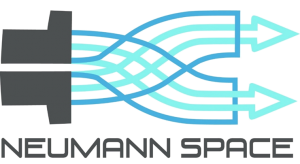Introducing Neumann Space
Founded in 2015, Neumann Space is an Australian-owned company that provides world leading propulsion systems for spacecraft.

The company’s origins are itself a story of innovation. It’s Chief Scientist and Founder, Dr. Patrick “Paddy” Neumann, developed the technology during his PhD for a plasma propulsion system that uses solid metal as propellant. The technology at its most basic level is the result of the complex combination of an arc welder and a camera flash in a vacuum environment, and its development in essence was the beginnings of the company’s work to revolutionise Space mobility.
Headquartered in Adelaide, South Australia, the nation’s space capital and with a growing multidisciplinary team, Neumann Space is accelerating the commercialisation of its technology for application in the space economy of today and exploring its potential for the space economy of the future.

A Bold Mission
With the growing amount of space junk fast becoming a risk to the development of a thriving space economy, the company has recognised the opportunity to use space debris as fuel with its technology.
This recognition is embodied in the company’s mission to enable the sustainable economic development of space.
Neumann Space is pursuing this mission today through dedicated R&D which has led to a succession of imminent in-orbit demonstrations of its technology.
The Need for Better Propulsion in Space
Today’s space economy is not about building moon bases or settlements on Mars. Instead, the space economy today is directed at solving the needs of our economies on Earth. This includes telecommunications, earth observation capabilities and national security satellites to name a few. And all these industries and initiatives are wholly dependent on propulsion.
The space economy’s immediate and pressing challenge for better propulsion has arisen due to the exponential growth of the number of satellites in our planet’s orbit. The tens of thousands of satellites to be sent to space in the next decade to provide communication services, to collect earth observation data or to support the Internet-of-Things, all must have the capability to move more safely and efficiently in Space Satellites, especially in Low Earth Orbit (LEO) must have a propulsion system to efficiently:
• Disperse from the rocket
• Reach their position in a constellation
• Maintain orbit
• Avoid collisions with other satellites or space debris
• And ultimately de-orbit at the end of their life to not contribute to space junk
Neumann Space is focused on innovating to provide better, safer and more efficient mobility to address the propulsion challenges facing this evolving space economy.

The Neumann Drive®
The Neumann Drive® is the name of the electric propulsion system developed by Neumann Space, and the first ever made in Australia. It uses the company leading-edge patented technology to transform a solid conductive metal such as Aluminium, Molybdenum and many others to generate thrust in Space.
The advantage of the Neumann Drive to Satellite manufacturers and Space technology companies resides in the use of a metallic propellant and the simplicity of the propulsion system. Together these provide a unique set of competitive advantages including:
• Superior fuel efficiency
• Simple design
• Safe to handle and operate
• Storable fully fuelled and integrated
• Suited for high volume manufacturing
• Scalable from small to large satellites
• In the future, refuellable from Space debris.
Launching to the world and beyond
The innovation inspired by Paddy Neumann, funded by private investors, and developed by a talented team of engineers, will see the Neumann Drive® fly on several Australian and American satellites in the coming years, with the inaugural flight scheduled for 2023.
This work will set the foundation for Neumann Space products to quickly become a feature on satellites, enabling them to move in Earth’s orbit and beyond. Looking ahead, the company’s mission will continue to inspire and drive the ingenuity of its people, ensuring that South Australia has a growing role in the space economy for decade and decades to come.















